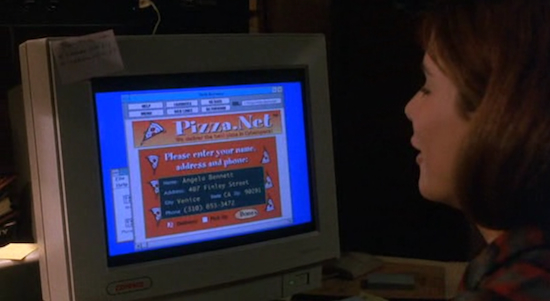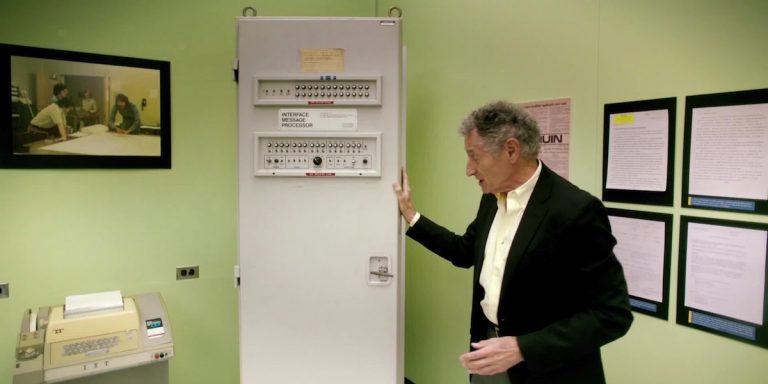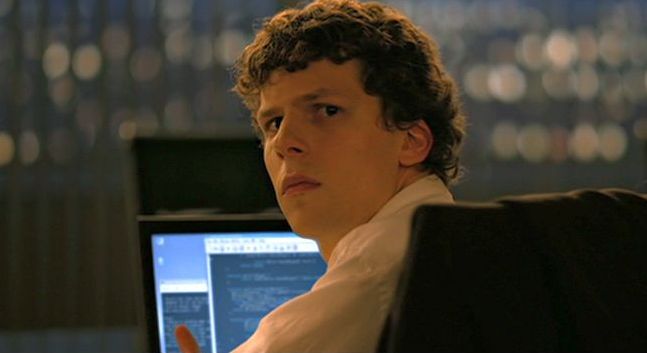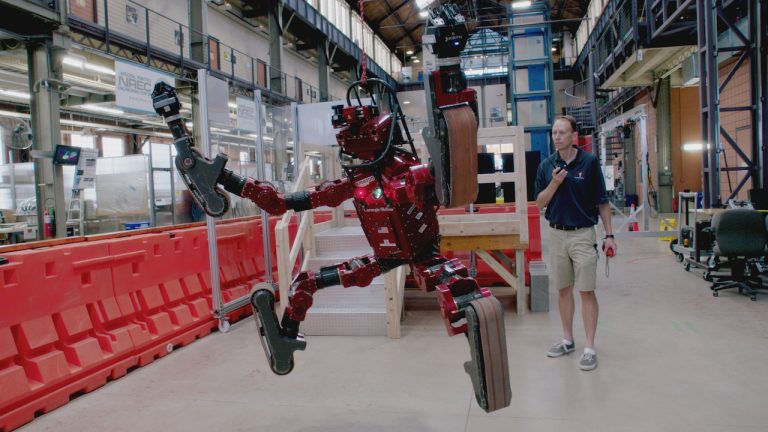“The question ‘Is this technology good or bad?’ is an incompetent question. It’s humans who are good or bad. Technology doesn’t have any qualities. It has technical qualities, yes. The internet is fast; the internet has many ramifications worldwide, and so you can quantify certain things, but you cannot endow it with qualities like good or bad.” –Werner Herzog, in an interview with The Verge
Hardly the first person to opine that technology is inherently neutral, Herzog considers its many facets—promising, good, ugly, sinister—in his new film Lo and Behold, Reveries of the Connected World. Herzog’s position is ultimately one of ambivalence, but in the film his mood oscillates between optimism and pessimism from chapter to chapter (ten in total). Lo and Behold touches on so many topics and ideas—from early internet history, to online harassment, to crowdsourcing intelligence, to robotics, to AI, to hacking, to a sanctuary free of network signals, to just about everything in between—that it actually amounts to a rather superficial film. Here’s a choice selection of quotations to give a sense of how much ground it covers:
“Maybe the companionship of robots, an intelligent Internet, will be sufficient. Who am I to say?”
“The real danger to gaming is when I stopped being present in the real world. More often I was in the game world.”
“Our sun: the giver of life. At the same time, it is hostile, destructive. Protuberances unimaginable in size are being hurled into the universe. These solar flares may be the undoing of civilization.”
This film, like me, has ADHD. It begins to examine the flotsam and jetsam lining the opening of a rabbit hole, exposes some jewels of thought further down, takes a few inquisitive looks, and then, before the gravity of curiosity plunges everything downward, forcibly moves on to something else. This is one of Lo and Behold‘s greatest faults. It’s as if Herzog had too many big ideas to cram in, but not enough time (or interest) to fully explore them all. Lo and Behold is not the first nor the last film with an incomplete understanding of such technologies. The depiction of the internet in cinema has been exceedingly disappointing throughout the decades, often more hilarious or distracting than necessary. There are classic examples, like Sandra Bullock ordering pizza online in 1995 inThe Net, or Tom Cruise e-mailing “Max@3:15” in Mission Impossible. A multitude oflisticles can be found online that detail such flubs.

“The corridors here look repulsive,” says Herzog in the opening scene of Lo and Behold, describing a drab hallway at UCLA where the first internet connection took place. “And yet this one leads to some sort of shrine reconstructed years later when its importance had sunk in.” Describing the first interconnected computer, located within that shrine, internet pioneer Leonard Kleinrock continues the history lesson, his voice a combination of amusement and seriousness: “This particular machine is so ugly on the inside it is beautiful. It has a unique odor, a delicious old odor from all the old parts.”

We rarely think about the physical nature of the internet like we once did—servers, CPUs, networks, wires, modems, routers, ports, laptops—because such elements now are smaller, sleeker, invisible, integrated into even tinier, sleeker devices like tablets and phones. The internet is more ethereal than it ever has been because we bid farewell to all the ugly equipment once necessary to get us online. And we’re always online. Today, we’re just so damn impatient, ignoring present company to focus on our smartphones for a quick dopamine rush. Check your Twitter notifications, post a silly Snapchat story, order an Uber. In Lo and Behold, Kleinrock says he dreams of the day when the internet will be as embedded, available, and accessible as electricity. And while we may not be there yet technically, we are there cognitively. We take our interconnected world for granted. Outside of small examples nestled in subcultures—cyber bullying, Twitter’s harassment policies, addictions to gaming—we rarely question what it all means, or how the internet is affecting us.
Films that try to explore such questions—like Gamer, Nerve, and Men, Women & Children—do so at the peril of their reception, constructing heavy-handed morality plays that amplify the real dangers of the internet to such ludicrous degrees that they’re impossible to take seriously. The more successful films involving the internet don’t focus obsessively on the technology or make generalizations. Rather, they incorporate technical characteristics into a story that’s already interesting. Most people would agree Ernst Lubitsch’s The Shop Around the Corner is the superior version of its modernized remake, Nora Ephron’s You’ve Got Mail. But the underlying love story—about two strangers figuring out who they are and what they want in the process of writing letters to each other—is so fascinating that the story works just as well with handwritten letters as it does with email. (The later film’s antiquated use of AOL even holds a certain charm).

The Social Network may not be a remake, but some have called it a modern Citizen Kane. That film doesn’t shy away from using technical language or showing real code as Mark Zuckerberg (Jesse Eisenberg), fueled by a grudge against a girl who dumped him (Rooney Mara), creates the proto-Facebook in a memorable scene. Verisimilitude is not a necessity in film, but it’s refreshing to see a fictional character talk about technology in an authentic fashion, especially when that hard-to-follow lingo is thrown into easier-to-understand colloquialisms and the casual blogging style of someone logging every single step of his creation. The mix of Zuckerberg’s heady brainstorming, technical wizardry, endurance, and intensity of emotion are all encapsulated in this breathtaking scene, and finally intertwine a duality of humanity and technology based on a very base desire for revenge.
The underlying impression one gets from watching Lo and Behold is that the German septuagenarian doesn’t quite understand as fully or as deeply what the internet actually is all about. Herzog’s limited conceptual understanding is especially evident when he naively asks his subjects if the internet can “dream.” But somehow his particular perspective makes the film more interesting. I don’t mean to be ageist or suggest that Herzog’s intelligence doesn’t quite match his subject matter. Many of us who grew up with the internet ready-made are guilty in gently poking fun of Herzog’s signature voiceover narration style, or finding his ignorance of Pokémon Go to be “cute” or “funny” or whatever.It’s strange and ironic that our internet culture has enabled Herzog’s meme-ification. Yet our feeble attempts to be funny while sitting in our pajamas at home sound all the more hollow when we compare ourselves to Herzog, who’s spent his life trying to understand and explore many aspects of the world around him using cinema. Perhaps we’re in dire need of a film like Lo and Behold, which in its simplicity reminds us that our total immersion in technology is something we often take for granted, and don’t often think enough about.

